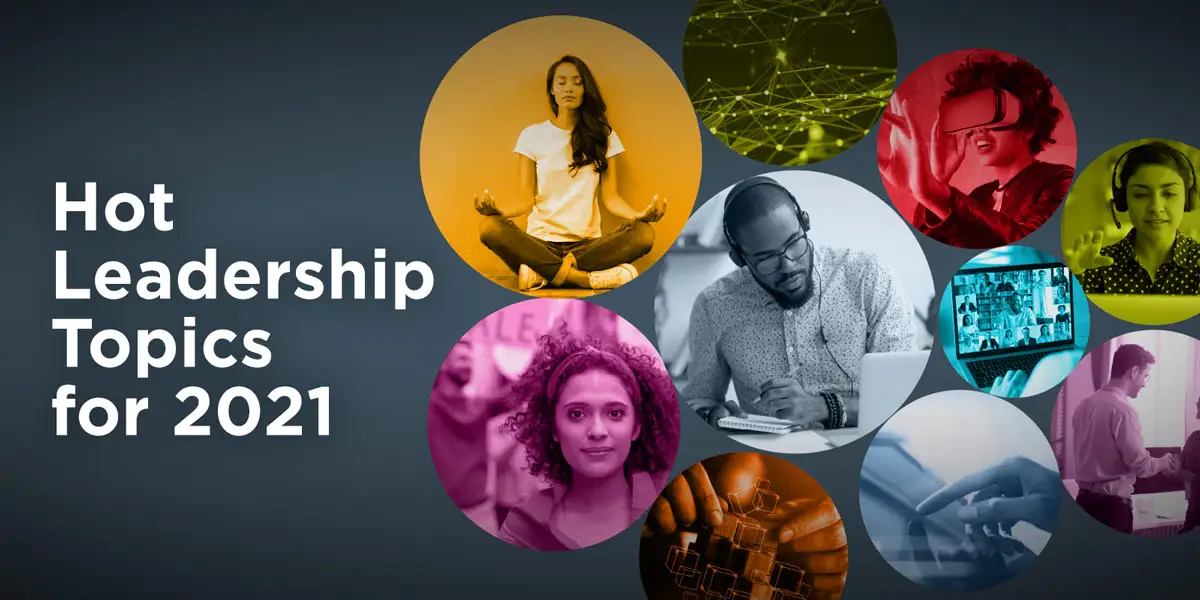Trends are emerging now that help reveal how the future of work is shaping up for 2020 and beyond. What are the most critical issues for leaders to watch out for in the coming year, and which will have the most substantial impact on the workplace as we head into the next decade?
For the past four years we’ve been tracking the topics that stand out according to top HR and leadership influencers. This year there are distinct upward trends in some issues that continue to drive impact in business and the workplace, as well as new challenges that are rising for HR and business leaders to confront in the years and decade ahead.
The top 10 hot leadership topics for 2021 and emerging trends that will shape the future of work, according to top HR and leadership influencers.
—
Below are the 10 headline topics that make up this year’s hot list (check out the list for 2020 and 2021 here), based on having the most frequent coverage in social shares across 20 top HR and leadership influencers (listed at the end of this post).
- The continued rise of AI Artificial Intelligence has continued its upsurge as a hot topic as well as a rapidly-developing area of technology, and 2019 will be no different. In the past year, advancements such as those demonstrated in AI-generated audio by Google’s new Duplex digital-assistant technology and AI image generation from Nvidia helped to cross uncanny valleys and new boundaries of realism. As Gartner highlights in its Top 10 Strategic Technology Trends for 2019, the influence of AI and developing AI-driven technologies will continue to impact the work that people can and will do well into the future.
- Feeding a culture transformation The topic of how to shape and leverage company culture continued to come up a lot this past year, often in overlap with other topics on this list as a key factor influencing people and their work. We expect this focus on how culture can drive high-performance and innovation, as well as improve employee engagement and retention, will continue as leaders and decision-makers grapple with how they can leverage new technologies in the workplace.
- Keeping up with the data eruption We have enough data from four years of tracking these trends to know that this is a predictable hot topic. According to Domo, over 2.5 quintillion bytes of data are created every single day, and it’s only expected to grow from there. By 2020, an estimated 1.7MB of data will be created every second for every person on earth. With all this amassing data, it’s no surprise that in the year of GDPR (General Data Protection Regulation) we saw “personal data” surge as a particularly hot topic and a challenge that leaders and organizations around the world had to meet head-on. As more people and business decisions are influenced by data, leaders and decision-makers must continue to be vigilant in how they use their data to track behaviors and influence people and consumers.
- Diversity boosts innovation Diversity has been, and will continue to be, a strong focus for organizations as they strive to unleash the full potential of a workforce that better reflects and understands their consumer populations. This continues to spring back as a hot topic among influencers, with more frequent social posts about diversity this past year than the previous two. It also got a boost this year due to new research that demonstrated that companies who have a more diverse workforce are better at developing innovative products and services.
- Robots are here to stay Robots are a topic that surged onto our hot list two years ago, and they are clearly here to stay. From cobots (robots who collaborate with people in a workspace) to AI-driven security bots and other robots designed to operate on their own (or with limited guidance) to increase production, we saw an abundance of commentary on new developments in the use of robotics in the workplace this year. As advancements continue into 2020, there will be new opportunities for organizations and their leaders to find ways to leverage robots to free teams from more task-based work.
- Embracing more frequent change Change continues to be a hot topic, as many influencers noted this year, because it’s happening faster, driven by rapid technological innovation, and is clearly not slowing down or going away. As a result of all the rapid changes taking place in technology and how people work, it’s more critical for leaders to demonstrate adaptability and resilience. Leaders can help their teams better embrace what’s new by communicating a positive vision of change in combination with a vision of continuity, to emphasize what stays the same.
- Increased value for human skills With the rise of AI in the workplace, and on this trends list, there has been an increased attention and value for what is uniquely human. As more jobs and workplace activities are automated, people are freed from tasks that are largely routine and predictable, but they are also challenged to manage new technologies and exercise greater critical thinking and judgment. For leaders and organizations to succeed with AI, this means continuing to grow essential human skills such as communication, empathy, and trust, which cannot yet be mastered with AI.
- Employee experience overtakes engagement Although employee engagement previously appeared as a hot topic on the list, this was the first year that saw discussion of the employee experience overtake it in popularity. With increased expectations for personalized experiences that follow consumer trends, and a tight job market, there is a growing trend for companies to stay competitive by creating better employee experiences. Organizations that provide a more flexible and personalized approach to work and career development will continue to lead the way and set the bar for how to best retain and grow talent.
- Automation drives new skill shifts Automation has been around for centuries, but along with increased interest in robots and AI, it has created new buzz as a hot topic over the past two years. Influencers have continued to share insights and concerns about the impact automation will have on jobs for the future, including how many could be lost to machines. The good news is that, according to McKinsey, most organizations don’t expect workforce losses, but rather a shift in the composition of jobs and needed skills. There are variations expected by industry, but overall demand for cognitive skills will decrease, while the need for organizations to strengthen social and emotional skills will continue to grow significantly over the next decade.
- Ethics challenges for leaders and businesses For the first time the topic of ethics surged onto our list, most notably with the discussion of how leaders confront the new challenges posed by AI, and in reference to a growing number of ethics scandals. As PwC's 2016 Strategy& study found, this is a negative trend that has continued upward—with a 36 percent increase in the number of forced CEO turnovers due to ethical lapses between 2012 and 2016. The past year saw ethics issues emerge with tough lessons from the downfall of Theranos and a money-laundering scandal at Denmark’s Danske Bank that heighted the need for leaders who can model and maintain a culture of integrity.
While these 10 hot topics were the ones to receive the most airtime last year, and may continue to for good reason, there are others gaining attention that hadn't previously cropped up among influencers. Since these are also notable topics, even if they aren't the most frequent yet, below we call out some honorable-mention trends that are worth looking out for in the coming year.
Two ‘B-level’ emerging hot topics
Bias and blockchain are two new topics that emerged with more frequent engagement among influencers this year. Though they haven’t hit the top of our list yet, it’s clear that new attention is being paid to these topics. As an emerging technology that continues to gain attention and investment, it’s likely that blockchain will see even more rapid growth throughout 2019, with worldwide spending having doubled to $1.5 billion in the last year and expected to reach $15.9 Billion in 2023.
Bias was more frequently mentioned than ever before due to rising concerns in how technologies, in particular biased bots and algorithms, can negatively impact people and decision-making. It’s no coincidence that this is heavily related to one of our other hot topics, ethics. We expect to see more coverage of both of these topics as leaders and businesses face the very complex and difficult decision-making that comes along with rapid development and integration of more automated and AI-driven technologies.
Fading generational sensation
In contrast to the topics above that are rising, others that we’ve been tracking over time have continued to decrease in popularity. Most notably, generational hype continues to fall off as does discussion of the impact of Millennials in the workforce, which was a much more frequent topic two years ago. Even with this decrease, Millennials aren’t completely overlooked, unlike their Gen X counterparts who received zero mentions by influencers in the later part of the year.
Why is it that generations aren’t getting as much attention? It may be that there isn’t anything particularly sensational happening currently in terms of shifts in the workforce. Millennials have been overly-stereotyped and their entitlement overblown, Gen X has been overlooked, which means that for now we can only brace for the hype and impact that Gen Z will bear as more of this generation enters the workplace.
Purposeful inclusion: giving an equal voice to male and female influencers
Who we listen to, including what news and media we give our attention, helps to shape our understanding of what’s important. We found this is even truer when considering who influences the trends we recognize each year, and for the first year we set out to make sure that men and women had an equal voice in determining these hot topics.
Each year we take a data-driven approach to identifying a set of 20 current influencers for this post, evaluating the frequency and relevance of content posted over the last three months of the year, in addition to each influencer’s following on Twitter (requiring they have at least 10,000 followers).
This year, for the first time, we committed to having an equally gender-diverse set of influencers for our analysis to better reflect the underlying 50/50 distribution of the population. We also sought out a more regionally- and industry-diverse set of influencers and will continue to do so for future years as we track these trends to better prepare ourselves and others for success in 2020 and beyond.
20 leadership and HR social influencers who posted content used in our topic analysis:
| Abhijit Bhaduri | @AbhijitBhaduri |
| Adam Grant | @AdamMGrant |
| Cheryl Cran | @cherylcran |
| Dave Ulrich | @dave_ulrich |
| David Green | @david_green_uk |
| Ester Martinez | @Ester_Matters |
| Gianpiero Petriglieri | @gpetriglieri |
| Heather Huhman | @heatherhuhman |
| Liz Ryan | @humanworkplace |
| Jacob Morgan | @jacobm |
| Jeanne Meister | @jcmeister |
| Jim Stroud | @jimstroud |
| Jon Ingham | @joningham |
| Josh Bersin | @Josh_Bersin |
| Susan LaMotte | @SusanLaMotte |
| Meghan Biro | @meghanmbiro |
| Sharlyn Lauby | @sharlyn_lauby |
| Stacy Donovan Zapar | @StacyZapar |
| Steve Boese | @SteveBoese |
| Suzanne Lucas | @RealEvilHRLady |
Learn about how DDI can help you solve the biggest challenges in business today.
Stephanie Neal is a senior research consultant in DDI Labs. She leads market and trend research that drives leadership and business innovation, and is a co-author of DDI's Global Leadership Forecast.
Topics covered in this blog


